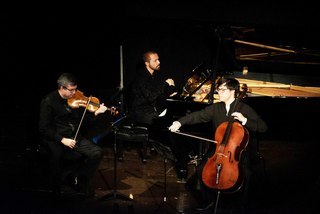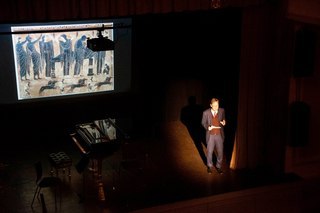|
Back
Elegies and Education New York
Bohemian National Hall
12/04/2019 -
Anatol Lyadov: Three Pieces, Opus 57
Mikhail Glinka: Trio Pathétique
Pyotr Ilych Tchaikovsky: Piano Trio in A Minor, Opus 50
Pavel Nersessian (Piano), Misha Keylin (Violin), Zlatomir Fung (Cello)
Stephen Johnson (Speaker)

M. Keylin, P. Nersessian, Z. Fung
(© Joshua Brown)
“Anyone who dared to depart from the conventional path was bound to incur Lyadov’s wrath. He’d shout ‘I cannot understand why you bother to study with me. Go to Richard Strauss, go to Debussy.’ He might as well have said, ‘Go to the devil.’”
Sergei Prokofiev, Autobiography
“How come Glinka, who had long been an insipid dilettante, suddenly in a single stride strands alongside (Yes! Alongside!) Mozart and Beethoven?”
P.I. Tchaikovsky, Diary
While the Tchaikovsky Trio virtually plays itself–given an excellent ensemble, given energy and dedication–it takes very special players to make something of Mikhail Glinka’s own Trio. The three musicians who played both works last night for a program called “Russian Elegy” came pretty close to making Glinka’s “non-Russian” work (what Tchaikovsky called music from an “insipid dilettante”) pretty interesting.
The Aspect Chamber Music series didn’t try to bring forth any advanced music from Russia. No Schnittke, no Boris Tchaikovsky, not even Shostakovich. Though, as introductory speaker Stephen Johnson, noted, the key word here was “elegy”, a word which summoned up much of the conservative Russian inspirations of the 19th Century.

S. Johnson (© Joshua Brown)
Mr. Johnson, a noted author, composer and Russiaphile himself, brought together some of Russia’s 19th Century paintings (as realistically conservative as the 20th Century’s Kazmir Malevich was radical), merging it with information about Lyadov and Glinka, and the usual anecdotes about Tchaikovsky’s self-doubts.
This was after three works by Lyadov himself played with Chopinesque grace by Russian pianist Pavel Nersessian. I happen to love Lyadov’s orchestral works–19th Century paintings by themselves–though these works were hardly more than salon pieces.
The wonder was that it was an Opus 57! One would have thought this musical Oblomov wouldn’t have written more than two dozen pieces.
The Glinka “Passionate” Trio (the word Pathétique is not the English pathetic) was the composer’s virtual imitation of Schubert. Schubert’s dimensions were of heavenly length. Glinka’s construction was unerring, but his inspiration was a few verst short of heaven. This was my initial hearing, and Glinka seemed, at least in the first movement, to be laboring along to give meaning.
That, and the quick scherzo were handled well by Mr. Nersessian, with powerful cello and violin by Messrs Keylin and Fung. Still, this was good playing without any special personality. That changed with the centerpiece, which obviously referred to the note by Glinka about lost love. The unrequited passion started with Mr. Keylin, followed by Mr. Fung, and the piano bringing up the rear of the composer’s fretting.
Where Schubert would allow his emotions the most beautiful melodies, Glinka was a bravura opera composer. The trio here played well here, and continued their lament through the finale, and one was happy to hear it all. Still, one doesn’t need these Austrian/Italian imitations. The operas are brilliant enough for the future. Glinka really was Russian.
After the intermission we had the Tchaikovsky Piano Trio which undoubtedly deserved the name masterpiece. Three movements that were played with all the Russian elegiac pizzazz necessary. Mr. Nersessian commanded the opening, playing a virtual concerto movement with the two strings working with what Glinka lacked: a memorable theme, a theme which was undoubtedly Slavic, even Russian.
So notable is this melody that the group didn’t need any special intensity. That came later with a spread-out development leading to the center theme and variations.
Here was where the whole group was shining, from simple variant to a Bach-like fugue to a funereal almost crying slow lament. It was lengthy but had such interest that one never felt the length. And the end, where Tchaikovsky writes in the score “crying” is a a heartstring-puller.
The finale was Tchaikovsky without tears. One of his peasant dances (did the composer ever know any peasants? One doubts it, though he certainly liked imitating them.) finishing with repeats, with blackness, with a whole smorgasbord of emotions.
The group last night had the balance, the tension, and the obvious joy-in-desperation to proceed with this single work which stood as a Ural mountain against its pleasantly embroidered steppes of its predecessors.
Harry Rolnick
|